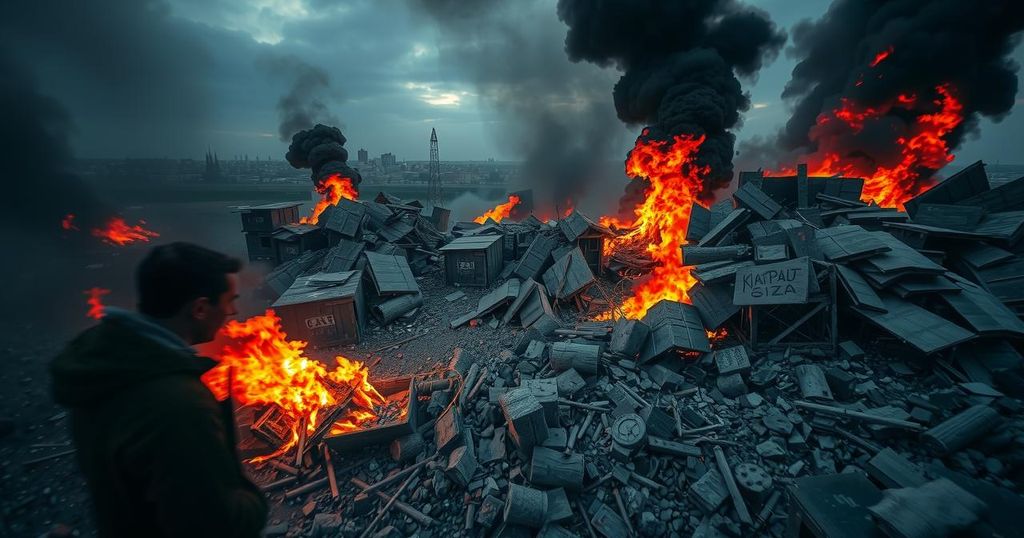The Gaza conflict has reached its 379th day with increased Israeli military actions leading to numerous civilian casualties and a pressing humanitarian crisis. International leaders are advocating for a ceasefire amid heightened military tensions both in Gaza and Lebanon, where Hezbollah has also engaged Israeli forces. Reports of Israel’s ongoing blockade and alleged starvation tactics have raised significant humanitarian concerns.
The ongoing conflict in Gaza has persisted for 379 days, during which Israeli forces continue to conduct military operations and maintain a blockade on the northern regions of the territory. Recent airstrikes targeting the Jabalia refugee camp have resulted in numerous casualties, predominantly affecting women and children. In conjunction with these air raids, the Israeli military has escalated its ground operations in this area, deploying additional troops to intensify their campaign. The Ministry of Health in Gaza reported three significant massacre events caused by the Israeli forces within a 24-hour period, resulting in 19 fatalities and 91 injuries, raising the cumulative toll to 42,519 deaths and 99,637 injuries since the hostilities escalated on October 7, 2023. Furthermore, the disruption of communication networks in the northern Gaza Strip has been described by Hamas as a tactic to isolate the Palestinian populations and conceal the ongoing violence perpetrated by Israeli forces. Significantly, tens of thousands of civilians in the Jabalia region have remained in their homes, defying orders to evacuate amidst increasing military pressure. In a related development, Hamas announced the assassination of its leader, Yahya Sinwar, while international leaders, including those from the United States, France, Germany, and the United Kingdom, have called for an end to military operations in Gaza and the resumption of humanitarian aid. In a concerning indication of ongoing violence, Michael Fakhri, an independent UN investigator on the right to food, remarked that despite the delivery of substantial aid, including food, Israel is conducting what he termed a “starvation campaign” against the population in Gaza. On the operational front, the Al-Quds Brigades, affiliated with the Islamic Jihad movement, reported the destruction of an Israeli military vehicle using improvised explosives, and Hamas’s Qassam Brigades targeted Israeli military equipment with anti-tank missiles. In Lebanon, Israeli forces reported successful interception of drones originating from the country, one of which detonated near an Israeli building without causing injuries. Hezbollah’s response included missile attacks on northern Israeli cities, while Israeli aerial operations continue across southern Lebanon and the Bekaa region. As military tensions escalate, Lebanese Prime Minister Najib Mikati emphasized the priority of achieving a ceasefire and ensuring the protection of civilians, alongside a commitment to international resolutions regarding military engagements in the region.
The situation in Gaza has been characterized by a persistent humanitarian crisis and military confrontations between Israelis and Palestinians. The conflict has intensified since October 2023, with significant casualties reported among civilians, including women and children. The international community has increasingly called for ceasefires and humanitarian assistance as military operations escalate in both Gaza and neighboring Lebanon, where tensions have also risen due to cross-border hostilities involving Hezbollah and Israeli forces. Understanding the geopolitical complexities and humanitarian concerns is crucial for a comprehensive perspective on the ongoing violence.
The conflict in Gaza, now extending into its 379th day, highlights the dire humanitarian crisis faced by civilians, with ongoing military actions resulting in substantial casualties. The siege and airstrikes have prompted international calls for a ceasefire and humanitarian aid, although the situation remains precarious. Concurrently, tensions in Lebanon, marked by missile exchanges between Hezbollah and Israeli forces, complicate an already volatile regional landscape. It is imperative for the international community to advocate for peace and de-escalation to prevent further suffering of innocent civilians.
Original Source: www.dailynewsegypt.com







